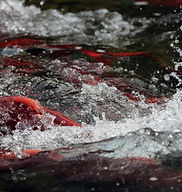Native Village of Golovin Hazard Mitigation & Climate Adaption Plan Integration
- Norton Bay Watershed Council

- Jul 23, 2025
- 2 min read
Updated: Aug 21, 2025

Changing weather patterns in Alaska have already brought substantial impacts to Native village and other communities in Alaska.
Coastal erosion, flooding and related impacts to infrastructure, drinking water and human health represent a substantial risk to water resources. At the same time, federal agencies require the development of Hazardous Mitigation Plans as a pre-requisite before communities can receive funding for emergency mitigation relief or planning projects related to the impacts of climate change.
Development of Hazardous Mitigation Plans provide the Villages with the means for taking on the ground action including use of traditional knowledge and implementation of tribal sovereignty to address climate adaption and mitigation.
With funding from the Kresge Foundations, a high priority goal for the native villages of Norton Bay was to create hazard mitigation plans to address the immediate impacts of climate change for village infrastructure and safety, such as flooding and coastal erosion that are already occurring. With approved Hazardous Mitigation Plans are in place, the villages will qualify for FEMA funding that can allow adaptive management practices for the village health and safety. The project goal of integrating a Hazardous Mitigation Plan with a climate assessment for the Native Village of Golovin can serve as a model of action for other villages in the region.
The Native Village of Golovin benefitted from the Hazardous Mitigation Plan & Climate Adaption Plan through trainings on and development of localized adaption and hazardous mitigation planning; implementation and development of federal and state policies to address Alaska Native and rural community climate change adaption and mitigation including implementation of federal trust responsibility; and use of traditional knowledge and implementation of tribal sovereignty to address climate adaption and mitigation.








Comments